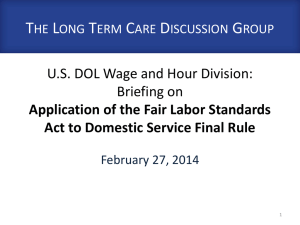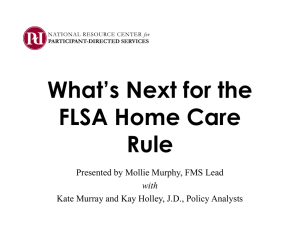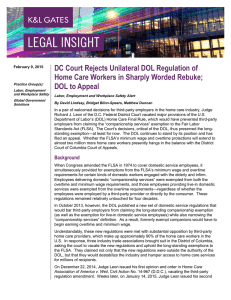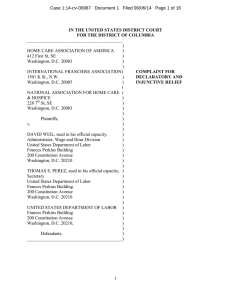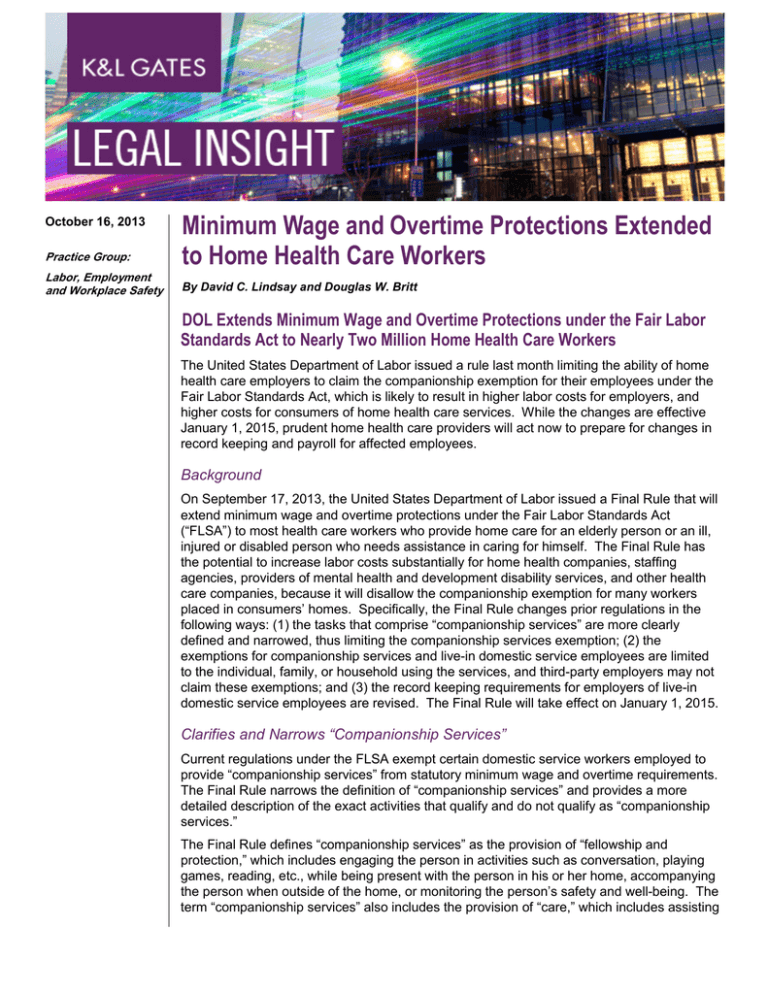
October 16, 2013
Practice Group:
Labor, Employment
and Workplace Safety
Minimum Wage and Overtime Protections Extended
to Home Health Care Workers
By David C. Lindsay and Douglas W. Britt
DOL Extends Minimum Wage and Overtime Protections under the Fair Labor
Standards Act to Nearly Two Million Home Health Care Workers
The United States Department of Labor issued a rule last month limiting the ability of home
health care employers to claim the companionship exemption for their employees under the
Fair Labor Standards Act, which is likely to result in higher labor costs for employers, and
higher costs for consumers of home health care services. While the changes are effective
January 1, 2015, prudent home health care providers will act now to prepare for changes in
record keeping and payroll for affected employees.
Background
On September 17, 2013, the United States Department of Labor issued a Final Rule that will
extend minimum wage and overtime protections under the Fair Labor Standards Act
(“FLSA”) to most health care workers who provide home care for an elderly person or an ill,
injured or disabled person who needs assistance in caring for himself. The Final Rule has
the potential to increase labor costs substantially for home health companies, staffing
agencies, providers of mental health and development disability services, and other health
care companies, because it will disallow the companionship exemption for many workers
placed in consumers’ homes. Specifically, the Final Rule changes prior regulations in the
following ways: (1) the tasks that comprise “companionship services” are more clearly
defined and narrowed, thus limiting the companionship services exemption; (2) the
exemptions for companionship services and live-in domestic service employees are limited
to the individual, family, or household using the services, and third-party employers may not
claim these exemptions; and (3) the record keeping requirements for employers of live-in
domestic service employees are revised. The Final Rule will take effect on January 1, 2015.
Clarifies and Narrows “Companionship Services”
Current regulations under the FLSA exempt certain domestic service workers employed to
provide “companionship services” from statutory minimum wage and overtime requirements.
The Final Rule narrows the definition of “companionship services” and provides a more
detailed description of the exact activities that qualify and do not qualify as “companionship
services.”
The Final Rule defines “companionship services” as the provision of “fellowship and
protection,” which includes engaging the person in activities such as conversation, playing
games, reading, etc., while being present with the person in his or her home, accompanying
the person when outside of the home, or monitoring the person’s safety and well-being. The
term “companionship services” also includes the provision of “care,” which includes assisting
Minimum Wage and Overtime Protections Extended to
Home Health Care Workers
with Activities of Daily Living (e.g., dressing, grooming, feeding, and bathing) and
Instrumental Activities of Daily Living (i.e., tasks that enable a person to live independently at
home, such as meal preparation, driving, and light housework), when the care is provided
attendant to and in conjunction with the provision of fellowship and protection, and does not
exceed 20 percent of the total hours worked per caregiver person each week.
The definition of “companionship services” does not include the performance of medical
tasks that typically require training by medical personnel, such as catheter care, turning and
repositioning, ostomy care, tube feeding, treating bruising or bedsores, and physical therapy.
Household work performed primarily for the benefit of other members of the household is
also excluded from the definition.
Limits Exemptions for Companionship Services and Live-in Domestic Service
Workers
The Final Rule provides that the companionship services exemption is available only to the
individual, family, or household solely or jointly employing the worker, and only if the
companionship services duties test as described in the Final Rule is met. A third-party
employer of direct home care workers, such as a home health care agency, may not claim
the exemption for companionship services.
Domestic service workers who reside in the employer’s home and are employed by an
individual, family, or household are exempt from the overtime pay requirement, although they
must be paid at least the federal minimum wage for all hours worked. A third-party
employer, such as a home health care agency, may not claim the overtime exemption for
live-in domestic service workers, and must pay such workers at least the federal minimum
wage for all hours worked and overtime pay at one and a half times the regular rate of pay
for all hours worked over 40 in a workweek, even if the worker is jointly employed by the
household.
Revises Record Keeping Requirements for Employers of Live-in Domestic
Service Employees
The Final Rule imposes a record-keeping requirement for all employers of live-in domestic
services employees. This new rule requires, among other things, that an employer keep and
maintain a record of the exact number of hours worked by the employee.
Conclusions
The Final Rule will significantly impact employers’ ability to claim the companionship services
exemption from the minimum wage and hour provisions of the FLSA. Third-party employers,
such as staffing agencies, home health companies, and other health care providers, should
be aware of the limitations imposed by the new rule and should begin preparing immediately
to effectuate an orderly transition once the rule becomes effective on January 1, 2015.
This publication/newsletter is for informational purposes and does not contain or convey legal advice. The information herein should not be used or relied
upon in regard to any particular facts or circumstances without first consulting a lawyer.
2
Minimum Wage and Overtime Protections Extended to
Home Health Care Workers
Authors:
David C. Lindsay
David.lindsay@klgates.com
+1.919.743.7304
Douglas W. Britt
Douglas.britt@klgates.com
+1.919.743.7332
Anchorage Austin Beijing Berlin Boston Brisbane Brussels Charleston Charlotte Chicago Dallas Doha Dubai Fort Worth Frankfurt
Harrisburg Hong Kong Houston London Los Angeles Melbourne Miami Milan Moscow Newark New York Orange County Palo Alto Paris
Perth Pittsburgh Portland Raleigh Research Triangle Park San Diego San Francisco São Paulo Seattle Seoul Shanghai Singapore Spokane
Sydney Taipei Tokyo Warsaw Washington, D.C. Wilmington
K&L Gates practices out of 48 fully integrated offices located in the United States, Asia, Australia, Europe, the
Middle East and South America and represents leading global corporations, growth and middle-market companies,
capital markets participants and entrepreneurs in every major industry group as well as public sector entities,
educational institutions, philanthropic organizations and individuals. For more information about K&L Gates or its
locations, practices and registrations, visit www.klgates.com.
This publication is for informational purposes and does not contain or convey legal advice. The information herein should not be used or relied upon in
regard to any particular facts or circumstances without first consulting a lawyer.
©2013 K&L Gates LLP. All Rights Reserved.
3

